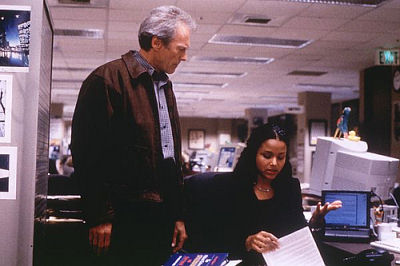




|
9 out of 10 |
 |
|
Despite Clint Eastwood being leading
actor and Director, this is no
gun-toting cop story, but a deep and thought-provoking drama that is in
many ways in the modern version of James Stewartís "Call Northside 777" of
the 1930`s. As an innocent man passes away his last few hours on death row
before his execution, a down-at-heel journalist, Stere Everett, played by
Clint is his only chance, yet even he must convince himself first of the
manís innocence.
The drama is all the more powerful for
the contrasts that are made. For
instance, most of the action is centred on two starkly different focal
points, the drudgery of work-a-day life in the Editorial office where small
trivial incidents are constantly occurring and his prison, where the
peaceful existence is merely the "quiet before the storm" as everyone
awaits the one staggering, literally life-changing event, the public
killing of a human being.
This movie, however, is not simply
anti-capital punishment propaganda, but
a sophisticated and well-directed piece of work that avoids stereotyping.
For instance, as has been the hallmark of Clintís films, the good guys
arenít too good and the bad not that bad. The journalist is a womanizing
drunk who sleeps with the wife of his boss, himself, a kind cynic who just
wants to sell more newspapers; the prison guards are not brutal monsters,
but very fallible, underpaid workers, who see the prisoner with either
ambivalence or marginal sympathy, and finally thereís the Prison Chaplain,
a supercilious, interfering idiot. Even the condemned man is an ex-con
with a list of convictions for a whole host of violent incidents.
Imagery adds edge to the story. Curiously, green is highly symbolic in the
story. In the bleakness of her fatherís cell, his daughter draws crude
drawings of the green pastures he will never see again, whilst in the next
scene, Clint is meeting a shallow and corrupt witness in an expensive
restaurant across one wall of which is a magnificent oil painting of the
same green pastures. Even appointment of Steve Everett to the story occurs
only after the accidental death of his colleague, the irony of a live saved
through another lost.
The casting is so good that
Clint Eastwood`s performance is lost amongst
dazzling Oscar-worthy ones from almost all the supporting cast. Bernard
Hill as the Prison Governor and Isiah Washington as the condemned man
produce a tour-de-force of drama. Isiah Washington releases raw emotion,
as a patient, innocent man, calmly struggling to cope with his imminent
death, whilst his erstwhile executioner, the Governor, is not a cruel or
weak man, but an intelligent, articulated professional. He has nothing
personally against his prisoner, and when his prisonerís daughter burst
into tears because sheís lost her green crayon, he promptly sends half his
guard force into the car park with all the latest in technology just to
find it for her, yet he is not soft and will "do the job" when the state so
requires.
Despite seeming to be a one-issue film,
it holds a further depth in
bringing in other issues. For example, just how far does a journalist go,
and what about the effects on his family? In particular, at one point, he
goes to question a witness in the slums. She observes how much effort is
going into finding the truth to save one manís life and asks poignantly,
"When my grandson was murdered in the park, where were you? Why werenít
you down here then trying to find out the truth about his death?"
Film Critic: Robert L Thompsett |
|